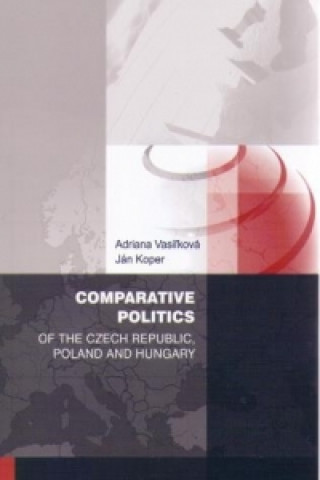
Kód: 09179951
Comparative politics of the Czech Republic, Poland and Hungary
Autor Adriana Vasiľková, Ján Koper
The logic of this monograph´s text lies in several fundamental premises that are gradually reflected and verified in the text. Firsty, the premises are modelled on the foundations of the historical development of the Czech Republi ... celý popis
- Jazyk:
 Angličtina
Angličtina - Vazba: Brožovaná
- Počet stran: 119
Nakladatelství: Professional Publishing, 2013
- Více informací o knize

Mohlo by se vám také líbit
-

World of Warcraft: The Shattering
223 Kč -

World of Warcraft: Stormrage
223 Kč -

BALKAN GHOSTS
479 Kč -

Notes on Nationalism
90 Kč -

Arabic For Dummies, 3rd Edition
553 Kč -

Maďarsko v éře sovětizace
324 Kč -

Češi a jejich komunismus
334 Kč
Informovat o naskladnění knihy
Zadejte do formuláře e-mailovou adresu a jakmile knihu naskladníme, zašleme vám o tom zprávu. Pohlídáme vše za vás.
Více informací o knize Comparative politics of the Czech Republic, Poland and Hungary
 Anotace knihy
Anotace knihy
The logic of this monograph´s text lies in several fundamental premises that are gradually reflected and verified in the text. Firsty, the premises are modelled on the foundations of the historical development of the Czech Republic, the Republic of Poland and Hungary. The first premise is based on the fact that all three states had a similar concept of their establishment and transformation into different state structures. During their previous history, they had become the parrt of mighty empires. Hungary and Bohemia became part of the Habsburg Monarchy, and Poland became a part of the Russian Empire in the 19th century. None of these three countries had state sovereignty or autonomous status. Despite this, they preserved their internal cohesion grounded in cultural, linguistic and historical identity. The end of World War II marked a turning point, when in accordance with the principles of the Versailles system various independent states were established in Central Europe. Poland and Bohemia (Czechoslovakia) seized their right to self-detemination, and joined the ranks of successful European countries with all their features of internal and external sovereignty. The second premise is represented by the analysis of political development after World War II., which despite some post-conflict unity requried from the states of the Soviet Bloc, did not result in the building up of the same and homegenous political structures. Poland, Hungary and Bohemia (within the framework of Czechoslovakia) followed specific lines of development and their own strategies ultimately focused od rejecting the model of power based on one political party.
 Parametry knihy
Parametry knihy
- Plný název: Comparative politics of the Czech Republic, Poland and Hungary
- Autor: Adriana Vasiľková, Ján Koper
- Jazyk:
 Angličtina
Angličtina - Vazba: Brožovaná
- Počet stran: 119
- EAN: 9788074311253
- ISBN: 978-80-7431-125-3
- ID: 09179951
- Nakladatelství: Professional Publishing
- Rozměry: 145 × 205 mm
- Rok vydání: 2013
Oblíbené z jiného soudku
-

Dune
249 Kč -

Haunting Adeline
621 Kč -

Berserk Deluxe Volume 2
1092 Kč -

White Nights
71 Kč -

Powerless
268 Kč -

Atomic Habits
330 Kč -

Dune Messiah
228 Kč -

Berserk Deluxe Volume 3
1142 Kč -

One Day
221 Kč -

Berserk Deluxe Volume 1
1115 Kč -

Iron Flame
368 Kč -

Surrounded by Idiots
213 Kč -

Harry Potter and the Prisoner of Azkaban (Minalima Edition)
993 Kč -

Gravity Falls Journal 3
441 Kč -

Heaven Official's Blessing: Tian Guan Ci Fu (Novel) Vol. 1
430 Kč -

The Creative Act
568 Kč -

Dune
276 Kč -

Hunting Adeline
624 Kč -

A Little Life
268 Kč -

Children of Dune
230 Kč -

Heaven Official's Blessing: Tian Guan Ci Fu (Novel) Vol. 2
427 Kč -

Bungo Stray Dogs, Vol. 8 (light novel)
382 Kč -

Percy Jackson and the Olympians 5 Book Paperback Boxed Set
944 Kč -

Solo Leveling, Vol. 1
440 Kč -

The Prisoner's Throne
247 Kč -

Court of Thorns and Roses
206 Kč -

Cry Baby Coloring Book
276 Kč -

Fourth Wing
444 Kč -

Icebreaker
205 Kč -

Berserk Deluxe Volume 6
1089 Kč -

Avatar, the Last Airbender: The Kyoshi Novels (Box Set)
968 Kč -

The 48 Laws of Power
608 Kč -

House of Leaves
611 Kč -

Twisted Lies
213 Kč -

Dune Messiah
277 Kč -

No Longer Human
311 Kč -

48 Laws Of Power
331 Kč -

Twisted Games
213 Kč -

Caraval Paperback Boxed Set
902 Kč -

Solo Leveling, Vol. 2
437 Kč -

Open Circuits
907 Kč -

Berserk Deluxe Volume 5
1119 Kč -

Heaven Official's Blessing: Tian Guan Ci Fu (Novel) Vol. 3
429 Kč -

Berserk Deluxe Volume 4
1125 Kč -

Court of Mist and Fury
206 Kč -

SOLO LEVELING V08
436 Kč -

English File Upper Intermediate Multipack A (4th)
487 Kč -

CHAINSAW MAN V14
254 Kč -

Before the Coffee Gets Cold
198 Kč
Osobní odběr Praha, Brno a 12903 dalších
Copyright ©2008-24 nejlevnejsi-knihy.cz Všechna práva vyhrazenaSoukromíCookies



 Vrácení do měsíce
Vrácení do měsíce 571 999 099 (8-15.30h)
571 999 099 (8-15.30h)